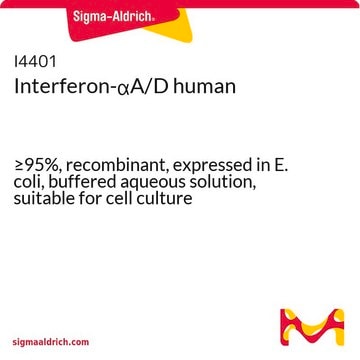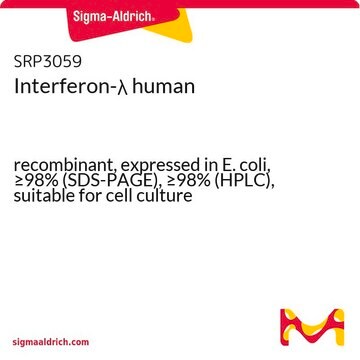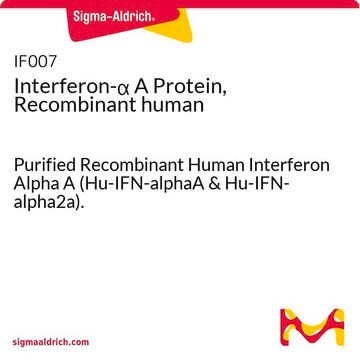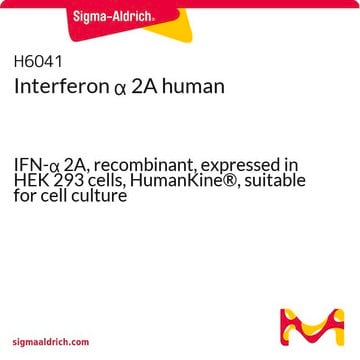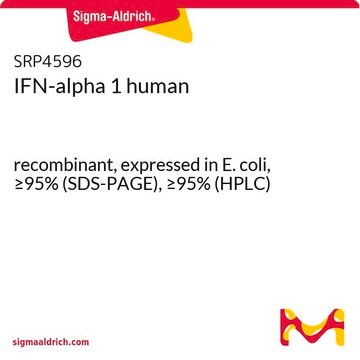I4276
Interferon-αA human
≥95%, suitable for cell culture, buffered aqueous solution, recombinant, expressed in E. coli
Synonym(s):
IFN-αA, Interferon-α2A
Sign Into View Organizational & Contract Pricing
All Photos(1)
About This Item
Recommended Products
biological source
human
Quality Level
recombinant
expressed in E. coli
Assay
≥95%
form
buffered aqueous solution
mol wt
19 kDa
packaging
pkg of 20 μg
concentration
≥0.2 mg/mL
technique(s)
cell culture | mammalian: suitable
impurities
endotoxin, tested
color
colorless
UniProt accession no.
shipped in
wet ice
storage temp.
−20°C
Gene Information
human ... IFNA2(3440)
Application
Interferon-αA human has been used to:
- study the effect of Chikungunya virus on interferon-mediated JAK (Janus kinase)-STAT (signal transducers and activators of transcription) signaling
- study the effect of interferon-α and PRK2 (protein kinase C-related kinase 2) inhibitors on hepatitis C virus replication
- compare the effect of Monascus pigment derivatives on hepatitis C virus replication
Biochem/physiol Actions
Cytokine with anti-viral, anti-proliferative, immunoregulatory, and proinflammatory activities. Type I Interferons are a closely related family of 165-172 amino acid proteins that are produced by leukocytes (α subtypes), fibroblasts (β subtypes), lymphocytes (ω subtypes) and ruminant embryos (τ subtypes). Interferon induces a variety of effects on target cells including antiviral, antiproliferative and immunomodulatory activities.
Physical form
Supplied as a solution in 5 mM sodium acetate, pH 4.0.
Analysis Note
The biological activity is determined in the cytopathic effect inhibition assay using MDBK cells with vesicular stomatitis virus (VSV). A cytopathic effect of 50% is produced with 1 unit/ml interferon. The units are determined with respect to WHO International standard reference for human interferonαA.
Storage Class Code
10 - Combustible liquids
WGK
WGK 3
Flash Point(F)
Not applicable
Flash Point(C)
Not applicable
Personal Protective Equipment
dust mask type N95 (US), Eyeshields, Gloves
Certificates of Analysis (COA)
Search for Certificates of Analysis (COA) by entering the products Lot/Batch Number. Lot and Batch Numbers can be found on a product’s label following the words ‘Lot’ or ‘Batch’.
Already Own This Product?
Find documentation for the products that you have recently purchased in the Document Library.
Customers Also Viewed
Jelke J Fros et al.
Journal of virology, 84(20), 10877-10887 (2010-08-06)
Chikungunya virus (CHIKV) is an emerging human pathogen transmitted by mosquitoes. Like that of other alphaviruses, CHIKV replication causes general host shutoff, leading to severe cytopathicity in mammalian cells, and inhibits the ability of infected cells to respond to interferon
Ji-Min Sun et al.
The Journal of antimicrobial chemotherapy, 67(1), 49-58 (2011-11-15)
Hepatitis C virus (HCV) infection causes chronic liver disease and is a major public health problem worldwide. The aim of this study was to evaluate the potential of Monascus pigment derivatives, which were derived from a microbial secondary metabolite synthesized
S-J Kim et al.
Journal of viral hepatitis, 16(10), 697-704 (2009-02-27)
Hepatitis C virus (HCV) infection is a serious threat to human health worldwide. In spite of the continued search for specific and effective anti-HCV therapies, the rapid emergence of drug-resistance variants has been hampering the development of anti-HCV drugs designed
S Rubinstein et al.
Journal of virology, 37(2), 755-758 (1981-02-01)
A convenient assay for interferons based on reduction of cytopathic effect was developed. The number of manipulations and the lengths of the various incubation steps were reduced to a minimum. The assay is simple to perform and can be completed
Shuai Shao et al.
JCI insight, 6(20) (2021-09-08)
Altered epidermal differentiation along with increased keratinocyte proliferation is a characteristic feature of psoriasis and pityriasis rubra pilaris (PRP). However, despite this large degree of overlapping clinical and histologic features, the molecular signatures these skin disorders share are unknown. Using
Our team of scientists has experience in all areas of research including Life Science, Material Science, Chemical Synthesis, Chromatography, Analytical and many others.
Contact Technical Service